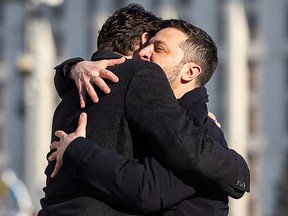Canada contributing $5B from frozen Russian assets and millions more in aid for military, energy and humanitarian efforts

If a peace deal can somehow be brokered to end the Russia-Ukraine war, Prime Minister Justin Trudeau said Monday that the possibility of Canadian troops being deployed to maintain the truce “is on the table.”
Trudeau first responded by remarking on the support provided years before the incursion and the connection between the two nations and then defended his administration’s efforts to increase its defence spending during his time in office.
“As to how we will be there,” he added, “we will work with our neighbours on it, but everything is on the table because we need to make sure that might no longer makes right in this world.”
After the formal news conference, Trudeau told reporters a ceasefire was the “first priority.”
“When we establish the way we’re going to keep a lasting peace … Canada will be involved, but we’re not at that position yet,” he said, adding that sending Canadians to Ukraine “is something to take very, very seriously.”
The reporter’s initial question came with a follow-up for both Trudeau and Zelenskyy regarding the importance of having a North American ally at a time when President Donald Trump is testing both country’s relationships with the United States.
Zelenskyy skirted the second part of the question, instead thanking Trudeau for facilitating a hybrid G7 call with Trump regarding the war, but the moderator moved on to the next question before Trudeau could respond.

Russia on the hook for $5B loan
The idea, first proposed by Canada according to a finance spokesperson, is to draw $68 billion from the reported $381 billion in frozen Russian central bank assets held in Canadian, European and other jurisdictions, and loan it to Ukraine. The money will be repaid by interest earned on the held assets, meaning “Russia, not Ukraine, will bear the burden of repayment.”
Protecting the power grid
The prime minister also said Canada would provide $50 million, through the Ukraine Energy Support Fund, this year so Ukraine can continue repairing and replacing energy equipment and infrastructure damaged by Russian attacks.

He said Russian troops have occupied facilities producing 18 gigawatts of power over the past three years, including Europe’s largest nuclear power plant in Zaporizhzhia Oblast.
Military money
Canada will also send another 25 light armoured vehicles (LAV III) and two armoured combat support vehicles. Ukrainian troops will be trained on the latter in Germany “shortly,” according to the PM.
The National Post is waiting for more information from the Department of National Defence regarding the cost and delivery of the equipment.
Trudeau also announced $40 million for “urgently needed capabilities to the Armed Forces” under the previously inked Agreement on Security Cooperation between Canada and Ukraine.

The 2024 bilateral pact called for Canada to provide $3.02 billion in macroeconomic and military backing for Ukraine.
This year, $15 million of that will stay at home to Canadian firms looking to expand into Ukraine’s defence sector.
A detailed breakdown of Canada’s entire military assets sent abroad is available on the government’s website.
Humanitarian help and local redevelopment
The big ticket items are $14 million over one year, in partnership with the United Nations partners and other organizations, to supply humanitarian assistance.
Canada is also shelling out $5 million over one year for personal protective equipment to protect against chemical, biological, radiological, and nuclear weapons, and $3 million over one year to bolster Ukraine’s nuclear security.
Values for other initiatives range between the tens of thousands to $25 million and will be delivered over two to seven years.
Ukraine’s Canadian tab approaching $20B
Since the war’s outset and including the ERA loan, Canada’s total “multi-faceted assistance” to Ukraine amounts to $19.7 billion, $12.4 billion of which has been monetary aid.
In the Kiel Institute for the World Economy’s Ukraine Support Tracker — which gauges military, financial and humanitarian contributions — Canada ranks fifth overall in allocations.
Broken down and based on GDP, Canada is first in financial allocations, but 22nd and 20th in humanitarian and military aid, respectively.
— With files from the Canadian Press
Our website is the place for the latest breaking news, exclusive scoops, longreads and provocative commentary. Please bookmark nationalpost.com and sign up for our daily newsletter, Posted, here.